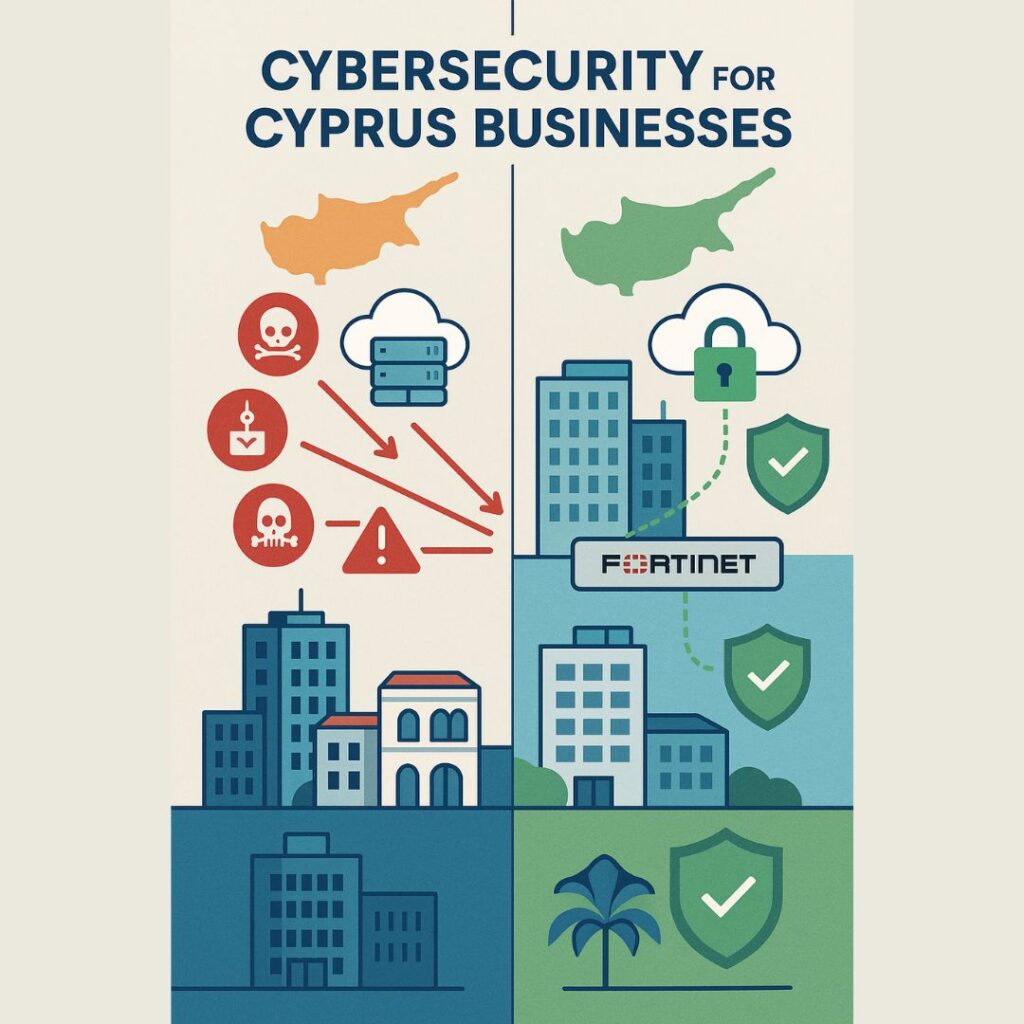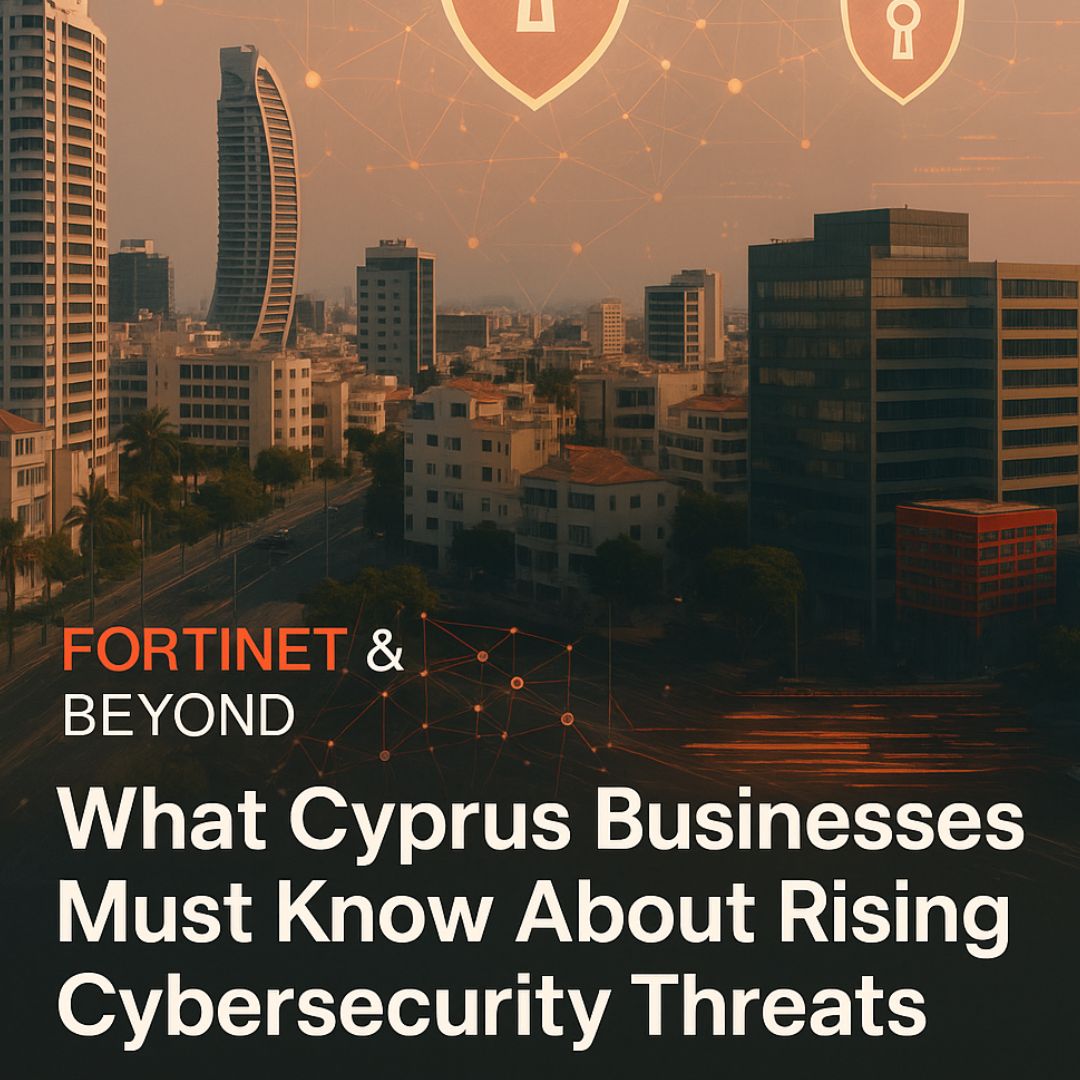Introduction: Fortinet in Cyprus
Cyprus is facing a surge in cyberattacks. From government portals and airports to SMEs, no organization is immune. For businesses, the question is no longer if they will be targeted, but when. The good news: solutions like Fortinet, combined with the expertise of local IT experts in Cyprus, can drastically reduce risks. This article breaks down the current threat landscape, why Fortinet is gaining ground in Cyprus, and how SMEs can strengthen defenses today.
Fortinet in Cyprus: Why It’s Gaining Traction
Fortinet in Cyprus and globally, is a leader in network security. Its FortiGate firewalls and integrated security solutions are now widely adopted in Cyprus through certified partners like GCC and IBSCY Ltd. What makes Fortinet stand out is its ability to combine performance with deep threat intelligence.
Why Cyprus businesses are choosing Fortinet:
- Next-Generation Firewall (NGFW): Real-time protection against malware, ransomware, and phishing.
- Unified platform: Network, endpoint, and cloud security all managed together.
- Scalability: Works for both SMEs and large enterprises.
- Compliance support: Helps meet GDPR and national security standards.
Need to compare if Fortinet or Palo Alto are the right choice for your business? Check out our recent article here

For SMEs that lack in-house IT staff, Fortinet offers enterprise-grade security without overwhelming complexity.
Cybersecurity Threats in Cyprus SMEs Face
Recent reports from national and EU cybersecurity agencies confirm a surge in cyberattacks targeting key sectors in Cyprus — including government portals, airports, utilities, and increasingly, private businesses. The threat landscape has evolved significantly, with attackers leveraging more sophisticated and automated tools to breach systems, disrupt services, and exploit data.
For SMEs (small and medium-sized enterprises), the risk is especially high. These organizations often lack the resources, expertise, or infrastructure to defend against modern threats — making them attractive targets for cybercriminals.
Key Cybersecurity Threats Affecting Cyprus SMEs:
1. Phishing Emails
Phishing remains one of the most common and effective attack methods. These emails are designed to look legitimate — often impersonating banks, suppliers, or even internal staff — tricking employees into clicking malicious links or entering sensitive information.
Trend to watch: AI-generated phishing emails in 2025 are becoming nearly indistinguishable from real correspondence, making employee training and email filtering more critical than ever.
2. Ransomware Attacks
Ransomware has evolved beyond simple data encryption. Attackers now exfiltrate sensitive files before locking systems, threatening to publish stolen data unless payment is made. This “double extortion” tactic poses a serious legal and reputational risk, especially under GDPR.
Real impact: A single ransomware incident can shut down operations, lead to client data breaches, and cost thousands in recovery and fines.
3. Insider Threats (Human Error or Malicious Intent)
Not all threats come from the outside. Insider threats — whether from careless mistakes or disgruntled employees — account for a significant portion of security incidents. Misconfigured cloud storage, weak passwords, and the use of unauthorized devices or apps can all open the door to attacks.
Key fact: Over 30% of reported data breaches globally stem from insider actions, according to industry reports.
4. DDoS (Distributed Denial-of-Service) Attacks
DDoS attacks overload websites, servers, or networks by flooding them with fake traffic. While these attacks may not compromise data directly, they can bring down systems and interrupt service delivery — especially devastating for ecommerce, online booking, or customer service platforms.
Local examples: Public service websites in Cyprus have already experienced such disruptions, showing these tactics are not just theoretical risks.
Why SMEs Are Especially Vulnerable in Cyprus
Many small businesses in Cyprus still rely on outdated software, minimal cybersecurity policies, and reactive IT support. Without dedicated in-house experts or advanced tools, they struggle to monitor threats in real time or recover quickly after an incident.
Common weaknesses include:
- Unpatched operating systems and legacy software
- Poor employee awareness or training
- No formal incident response plan
- Lack of multi-factor authentication (MFA)
Hackers see these gaps and specifically target SMEs, knowing the defenses are easier to bypass compared to large organizations with dedicated security teams.
What This Means for Business Owners
If you run an SME in Cyprus, now is the time to evaluate your cybersecurity posture. Even basic steps like employee training, using reputable endpoint protection, and setting up proper backup systems can significantly reduce your risk exposure.
Working with trusted IT experts in Cyprus who are familiar with local regulations and infrastructure can provide the expertise needed to implement scalable, affordable protection — before a breach happens.
Regulation & Compliance: The Cyprus Context
Cybersecurity isn’t just about stopping hackers—it’s also about staying compliant. Cyprus, as part of the EU, enforces strict rules under GDPR. The National Cybersecurity Strategy of Cyprus also outlines obligations for businesses to strengthen IT systems.
Compliance risks if ignored:
- Heavy GDPR fines.
- Loss of customer trust.
- Reputational damage after a breach.
Fortinet in Cyprus is designed with compliance in mind, making it easier for businesses to meet local and EU requirements
Learn more about Fortinet’s cybersecurity solutions on the official Fortinet website.
Choosing the Right IT Experts in Cyprus
Technology alone isn’t enough—you need the right expertise. Local IT experts in Cyprus help tailor solutions like Fortinet to business needs.
What to look for in an IT partner:
- Fortinet certification or partnership.
- 24/7 monitoring and fast response times.
- Experience with SMEs across sectors.
- Transparent pricing and clear service agreements.
Partnering with the right provider ensures that your Fortinet setup is properly installed, configured, and updated.
Practical Steps SMEs Can Take Now
Here’s how Cyprus SMEs can strengthen security immediately:
- Review firewalls: Upgrade to Fortinet FortiGate or equivalent.
- Patch systems: Keep all software updated.
- Train staff: Most attacks start with human error.
- Backup data: Store securely in the cloud or off-site.
- Consult experts: Get an audit from certified IT professionals.
Cybersecurity is a journey. Start with the basics, then build up with expert help.
Conclusion
Cybersecurity threats in Cyprus are real, rising, and costly. But SMEs don’t have to fight them alone. Fortinet solutions, combined with the skills of trusted IT experts in Cyprus, provide a clear path to stronger defenses.
The time to act is now. Review your systems, strengthen weak points, and plan your next steps.
FAQ: Fortinet in Cyprus
What is Fortinet and how does it help Cyprus businesses?
Fortinet is a global cybersecurity provider known for its advanced firewalls, intrusion prevention, and threat intelligence. In Cyprus, SMEs use Fortinet to secure networks, protect data, and meet compliance requirements.
Why are more SMEs in Cyprus adopting Fortinet solutions?
Small and medium-sized businesses in Cyprus face growing cyber threats like phishing, ransomware, and DDoS attacks. Fortinet offers scalable, affordable, and reliable tools that don’t require in-house IT teams to manage.
Is Fortinet compliant with GDPR and local Cyprus regulations?
Yes. Fortinet solutions help businesses meet GDPR data protection standards and align with the Cyprus National Cybersecurity Strategy. Features include logging, encryption, and data control.
How do I find a Fortinet-certified IT expert in Cyprus?
Look for providers who are official Fortinet partners or hold Fortinet NSE certifications. They will have access to advanced support, tools, and training to configure your security system correctly.
What’s the difference between Fortinet and other cybersecurity vendors?
Fortinet offers an integrated platform that combines firewalls, endpoint protection, and cloud security in one system. This makes it more efficient and cost-effective than using multiple disconnected tools.

